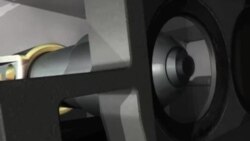NASA says there is new evidence that ancient Mars could have supported microbial life.
NASA's Curiosity rover has drilled into a rock near an ancient stream bed on the Red Planet, and the rover has analyzed the powdered sample of the rock's interior in its onboard lab.
Scientists say the sample from an area known as Yellowknife Bay contained some key chemical ingredients needed for life, including oxygen, hydrogen and carbon.
The lead scientist of the Mars Exploration Program, Michael Meyer, revealed the findings Tuesday at NASA headquarters in Washington.
"This was an ancient environment with the right elements, minerals indicating a near-neutral environment and slightly salty liquid water, all the pre-requisites to support life - a habitable environment," said Meyer.
Researchers say the Martian bedrock shows evidence of multiple periods of wet conditions. Clay minerals, which indicate water, are present in the grayish sample of Martian rock.
Curiosity project scientist John Grotzinger:
"I think we have found a habitable environment that is so benign and supportive of life that probably if this water was around and you had been on the planet, you would have been able to drink it," said Grotzinger.
Curiosity is exploring within a deep, 150-kilometer-wide depression called Gale Crater, and it will head toward a Martian peak called Mount Sharp. The car-sized rover landed on Mars in August on a two-year, $2.5 billion mission to explore the Red Planet but is not equipped to look for any microbes that may live on Mars today or fossils of those that are extinct.
NASA's Curiosity rover has drilled into a rock near an ancient stream bed on the Red Planet, and the rover has analyzed the powdered sample of the rock's interior in its onboard lab.
Scientists say the sample from an area known as Yellowknife Bay contained some key chemical ingredients needed for life, including oxygen, hydrogen and carbon.
The lead scientist of the Mars Exploration Program, Michael Meyer, revealed the findings Tuesday at NASA headquarters in Washington.
"This was an ancient environment with the right elements, minerals indicating a near-neutral environment and slightly salty liquid water, all the pre-requisites to support life - a habitable environment," said Meyer.
Researchers say the Martian bedrock shows evidence of multiple periods of wet conditions. Clay minerals, which indicate water, are present in the grayish sample of Martian rock.
Curiosity project scientist John Grotzinger:
"I think we have found a habitable environment that is so benign and supportive of life that probably if this water was around and you had been on the planet, you would have been able to drink it," said Grotzinger.
Curiosity is exploring within a deep, 150-kilometer-wide depression called Gale Crater, and it will head toward a Martian peak called Mount Sharp. The car-sized rover landed on Mars in August on a two-year, $2.5 billion mission to explore the Red Planet but is not equipped to look for any microbes that may live on Mars today or fossils of those that are extinct.













